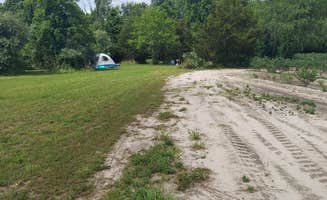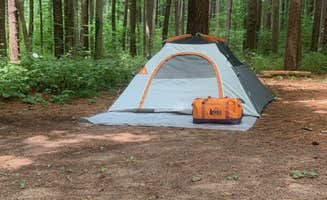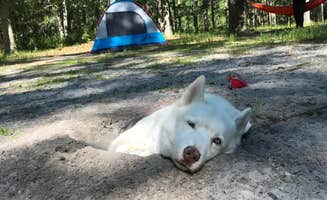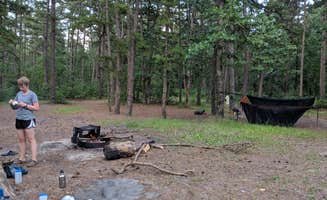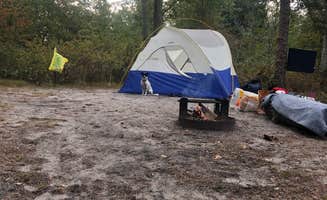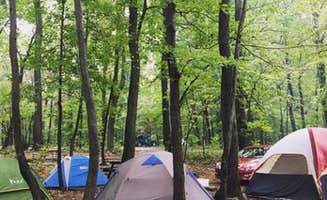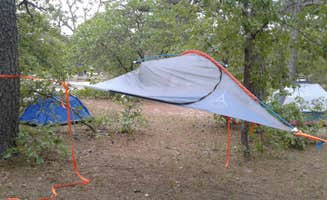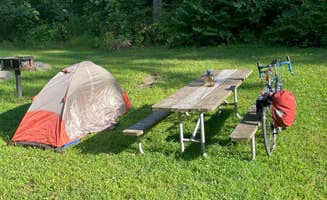Tent camping near Pilesgrove, New Jersey offers diverse experiences within the unique Pine Barrens ecosystem. The sandy, acidic soil of this region supports distinctive pine forests and cedar swamps that create a specialized habitat found nowhere else in the region. Summer temperatures in this area typically range from 75-90°F with high humidity, while spring and fall offer milder conditions with temperatures between 55-75°F and less precipitation.
What to do
Fishing opportunities: At Ridley Creek State Park, campers can find excellent water recreation. "Easy hike. We found a lot of really unique sites around the park. Will keep going back," reports Andrea R. The park provides "great spots to get a small creek swim in" according to Mackenzie B.
Horseback riding trails: Several parks in the region maintain dedicated equestrian paths. "I had the best time here hiking up and down the mini mountains. The water was clear and beautiful and I absolutely loved it," says Meg F. about her experience at Ridley Creek. The trails accommodate various skill levels with both flat and more challenging terrain.
Wildlife observation: The region serves as a major migratory path for numerous bird species. Evansburg State Park provides excellent viewing opportunities. "Lots of tree cover running along a small running creek," notes Gary O., making it ideal for spotting local wildlife in natural settings.
What campers like
Secluded tent sites: Batona — Wharton State Forest offers genuine wilderness camping experiences. "It is so easy to get lost in these woods and I LOVE IT! I grew up near the pine barrens and would camp here many times with friends," says Alyssa D. The campground provides a true escape from urban environments.
Group camping facilities: Some locations specialize in accommodating larger gatherings. "We stayed at a primative group campsite during Philly Questival. Each site was clearly labeled and flat with a fire pit. It definitely met our needs!" reports Jennesys A. about Batona Campground.
Sandy terrain for comfortable sleeping: The Pine Barrens' natural ground composition creates unique camping surfaces. At Blackbird State Forest, "The ground is dirt covered with woodchips and sometimes evergreen needles -- pretty easy to sleep in a tent," according to D R., providing natural cushioning not found in other regions.
What you should know
Limited facilities: Most primitive sites have minimal amenities. "No running water- only port a potties but they were clean," notes Sarah M. about Blackbird State Forest. Many locations have seasonal water access that may be unavailable during winter months.
Insect preparation: The wooded environment supports significant bug populations. "Just gotta check often for chiggers and ticks," advises Eldad K. about camping at Goshen Pond — Wharton State Forest. Proper repellent and regular body checks are essential during warmer months.
Reservation requirements: Many campgrounds require advance booking. "You can now reserve online at: https://www.chesco.org/1067/Camping," shares Jennifer S. regarding Hibernia County Park. Weekends during peak season (April-October) often fill several weeks in advance.
Tips for camping with families
Kid-friendly fishing spots: Dedicated areas for young anglers exist throughout the region. "The children's pond is a short ways away for well stocked fishing," mentions Anna about Hibernia County Park, providing spaces where children can practice fishing with higher success rates.
First-time camping locations: Some sites specifically cater to beginners. "This place is great for first time campers," says David K. about Ridley Creek State Park. "I go camping here almost every year and they a nice open field with two sites and two fire pits. They also have a tone of trails to hike on."
Playground access: Several parks maintain dedicated children's play areas. "Great playground," notes John Z. about Hibernia County Park, providing an alternative activity when kids need a break from hiking or water activities.
Tips from RVers
Access challenges: Many campgrounds have limited RV accommodations. At Blackbird State Forest, "RV camping is not encouraged. Horseriding is encouraged," reports D R. Sites often lack hookups and may have difficult access roads.
Size restrictions: Larger vehicles face significant limitations. For Batona Campground, meghan G. advises: "Site are suitable for tents or small campers. The unpaved road into the site is narrow and tree lined. A larger RV would not fit." Most sites accommodate vehicles under 25 feet only.
Sand road navigation: The Pine Barrens feature distinctive sandy access routes. "The road into the campground is about 1 mile of loose sand. It can be accessed by a standard vehicle," notes Trip Over Life about Batona Campground. Four-wheel drive or vehicles with good ground clearance perform better on these surfaces.


